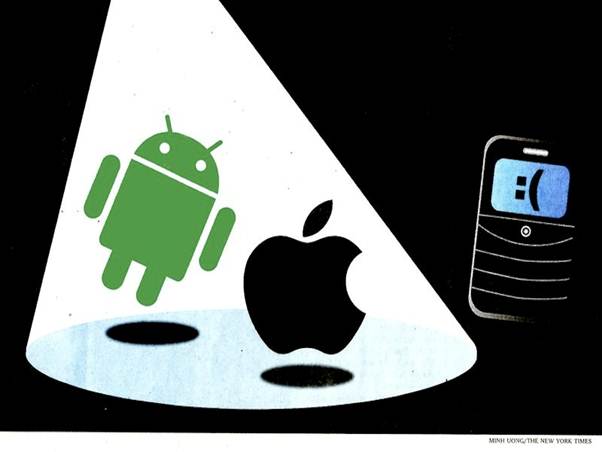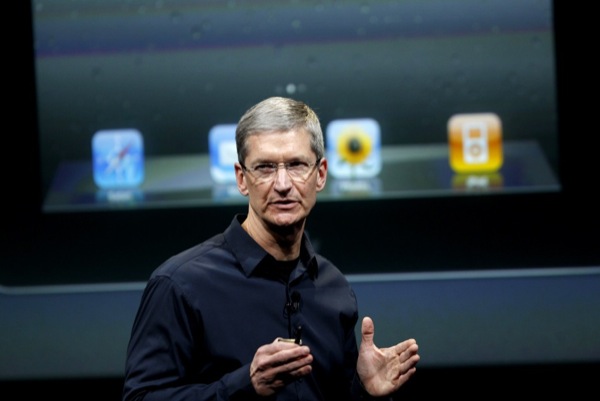The industry, however, is not just going to
lie down and take this. ‘If Microsoft is successful with Windows 8’, suggests
Enderle, ‘or Google decides to adequately resource Android on tablets, either
could obsolete the iPad, which could cripple Apple’.

Apple
CEO Tim Cook speaks in front of an image of an iPhone 4S at Apple
What Google will decide is anybody’s guess.
For all its bulk and brawn, under Larry Page – recently returned to the helm of
his own company on a CEO’s salary of $1, but there the comparisons with Steve
Jobs end – the search giant seems determined not to be distracted from the
quest for advertising revenue, and is more inclined to shed projects then
invest in them. Microsoft, on the other hand, is fully committed to readying
Window 8, which will work across desktop and mobile, and from the old foe in
Seattle.
Responding to an analyst characterizing the
tablet space as a two-horse race between iOS and Android, the Apple CEO
commented: ‘I wouldn’t say it’s a two-horse race; there’s a horse in Redmond
that always suits up and always runs, and will keep running. And there’s other
players that we can never count out’.
And then there’s Apple’s arch-nemesis, the
foe that’s returned to knock it down every few year since the day its
incorporation papers were signed: Apple itself.
Who can say why brands lose their appeal?
History is littered with firms that dominate until undetectably at first, they
decline and fall
Who can say why brands lose their appeal?
History is littered with firms that dominate a market, or at least a niche,
until, undetectably at first, they decline and fall. It may be attributable to
bad decisions; or it may be that no matter what the company does, its name
shifts over time from being new and edgy to familiar and safe to predictable
and mundane and finally to undesirable.

RIM’s
email-equipped mobile phone, originally locked into a garden with walls even
higher than Apple’s, found favour with corporate users because, along with
RIM’s server products, it provided functionality nobody else could otter
The fickleness of fashion is perhaps most
evident in, well, fashion, but it seems the tech industry may be just as
susceptible as the rag trade. BlackBerry is a case in point. RIM’s
email-equipped mobile phone, originally locked into a garden with walls even
higher than Apple’s, found favour with corporate users because, along with
RIM’s server products, it provided functionality nobody else could otter. As it
became less unique and more commoditized, a strange and fortunate thing
happened: the spouses, sons and daughters of the corporate users fancied their
own BlackBerry, and, as RIM’s prices were gradually eroded, could afford it.
Eventually all the cool kids had a BB, and wouldn’t switch because they needed
to talk to each other on BlackBerry Messenger (BBM), RIM’s closed social
network. Win!
Then, in 2011, sales suddenly began to
fall. There was no single explanation. Most BlackBerry users preferred buttons
to touch-screens and an affordable handset to an expensive iPhone contract; and
RIM should have picked up users from Nokia, whose traditional phone business
was in freefall. But it didn’t. Somehow the gloss had come off. BlackBerry, and
it RIM, continues to decline sharply and, in the opinion of many analysts,
terminally.
Something similar happened earlier to Palm,
once the leader in the smartphone precursor field of PDAs; and Sony, not
focused on one product area but with an even more widely recognized and
prestigious brand, has also found its mojo mysteriously absent. Compaq, the PC
market leader that was Tim Cook’s last employer before Apple, was swallowed up
by HP, which now finds itself in e relentless slide of its own. None of these
companies suddenly forgot how to make stuff; and if they made questionable
choices, they weren’t unique in that.

Tim
cook: What we focus on is innovating and making the world’s best products.
We asked Rob Enderle if there was anything
that could stop Apple from going out of fashion. ‘Nothing’.
Independent investor Rocco Pendola, writing
for the Street, thinks Apple is already in an endgame. ‘Each time Cook makes a
move that is normal, a move that is little more than a reaction to what
somebody else wants or other companies are doing, he erodes the abnormal,
downright quirky and 100% innovative attitude and persona that made Apple
great… He allows Apple to become its own inferior competition.
‘Of course, Cook is not doing it on
purpose, but he’s setting up some yet-to-be determined date in history when, on
an annual basis, people around the globe will ask. ‘Where were you the day
Apple lost its groove?’
It’s a cold reminder that nobody really
knows what makes empires wax and wane. Apple’s market capitalization has
tripled in less than three years to date. During 2008, on the other hand, it
halved. Shortly after Steve Jobs returned, in 1997, the stock was trading at
one fifth of its value five years earlier. This is not a steady business.
The last word should go to Tim Cook.
Continuing his riff on the race against industry rivals, he explained, in terms
that anyone who’s been paying attention to Apple and its leaders will find
oddly familiar: ‘What we focus on is innovating and making the world’s best
products. And we’ll keep on doing that and somewhat ignore how many horses
there are. We just want to stay ahead and be the lead one’.
It sounds so simple. But Apple won’t only
need to keep ahead of the pack. The real test will be whether it can jump the
fences.